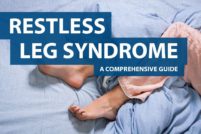This common sleep disturbance is experienced by millions of travellers every single day. But what exactly causes Jet Lag? And what can you do to recover, or even prevent it in the first place?
For decades jet lag was thought of as simply a state of mind — but extensive scientific research has shown that the cause of our post-travel slump is actually firmly rooted in our biology.
What Causes Jet Lag?
Jet lag is a temporary sleep disturbance which results from traveling quickly over a number of time zones. Also known as time zone syndrome, or desynchronosis, jet lag occurs when our circadian rhythms become out of sync with an actual day-night schedule. [1]
You can conceptualise your circadian rhythms as a biological clock which determines the day-night cycles of all your physiological functions, including sleep.
The most important cue this clock uses is light, which regulates how much melatonin the body produces: With levels being at their lowest during waking hours, and highest when it’s time to fall asleep. [2]
These rhythms are slow to adjust when we travel, and remain on their original schedule for several days while receiving conflicting cues from the environment. It’s this conflict that causes the symptoms characteristic of jet lag.
Air Travel Conditions That Contribute To Jet Lag
In addition to the effect of jumping time zones, other aspects of air travel have been shown to contribute to jet lag symptoms and duration.
- Sleep loss: Various factors of air travel make it difficult to catch-up on sleep, and frequent disturbances cut into the quality of the sleep you are able to get.
- Uncomfortable seating position: Being stuck in an unideal position for many hours on a transatlantic flight can make it near impossible to sleep soundly as your travel.
- Caffeine and Alcohol consumption: Both coffee and alcoholic beverages disturb sleep and can lead to you getting less rest/lower quality rest than you should on your plane ride over.
- Cabin pressure and high altitude: Studies have shown that both cabin pressure and altitude contribute to the development of jet lag symptoms, independent of the number of time zones crossed. [3]
- Low humidity: Planes have very low humidity levels which can cause you to become dehydrated if you do not consume enough liquids on your flight. Dehydration can worsen many symptoms of jet lag, such as headache.
Jet Lag Symptoms
The symptoms of jet lag you experience depend on a variety of factors, from your age and health status to how much food, alcohol and sleep you got on your flight.
Some people may only have one symptom, while others find themselves experiencing nearly every symptom listed below: [4],[5]
- Headache
- Fatigue & Lethargy
- Insomnia
- Irritability
- Depression symptoms
- Difficulty concentrating
- Loss of appetite
- Confusion
- Dizziness
- Gastrointestinal Upset
Needless to say, any combination of these symptoms can greatly reduce your enjoyment of that long awaited vacation — or cause a reduction in your performance on a business trip.
Which Direction Is Worse For Jet Lag?
While any travel into a new time zone can result in jet lag, studies have shown that traveling from West to East has the biggest impact on our sleep cycles. [6]
To understand why, let’s look at an example:
If you fly from New York and land in London at 10 p.m. local time, it’s only 5 p.m. back home. You’ll likely find it difficult to fall asleep, and end up heading to bed in the early hours of the morning.In contrast, if you fly from London and land in New York at 10 p.m. local time you’ll likely have no trouble tucking in for the night as back home it’s already 3 a.m.
So, if you’re planning on traveling eastward you should prepare yourself to experience more severe jet lag.
How Long Does Jet Lag Last?
As a basic rule of thumb, you will need one day of recovery for every time zone you cross. However, the effect is more pronounced when traveling eastward, and lesser when traveling westward.
In our earlier example of flying from New York to London, you have crossed 5 time zones and thus would require five whole days of recovery. That could be the duration of your entire trip! [7]
This is a worse case scenario — there are actually many you can do to prevent and/or reduce the severity of your jet lag, as well as speed up the recovery process. Before jumping on your next flight, check out these tips to fight jet lag.





